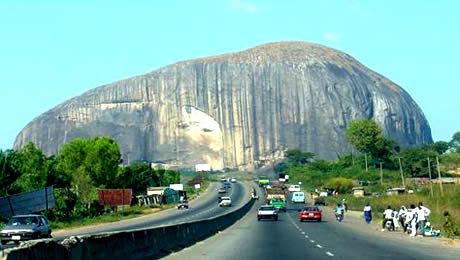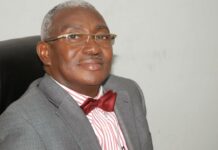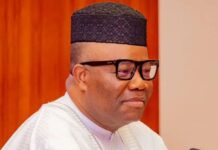By Edward Dibiana
In the scorching sun and draining heat of a sweltering afternoon, at a building construction site recently in Abuja, some artisans tangoed vociferously in a heated debate.
The debate centred on the hardship in the country that engineers diminishing faith in the political leadership of the country. The argument was specifically on who to blame between the immediate past Peoples Democratic Party (PDP) government or the incumbent All Progressives Congress (APC) administration for the wide-spread difficulty in the land.
In the encounter, coloured with passion, anger and disappointment, but undiminished logic, one of the artisans, shouting at the top of his voice (while performing the job that brought him to the site), said: “Make una no dey give me headache, abeg. The only president I know is this site engineer. Na only him dey remember me. My only governor na this Oga Foreman. Na only them two dey carry me come work make hunger no kill my family. Government no dey remember me. Dem no know me sef. For election, APC go give you T-shirt, PDP go give you T-shirt. Na shirt go feed your family? Politicians na the same for my village, for Abuja, for Kano and for everywhere.
“Politicians no care about us. Last election, I vote under sun. Next election, never…never…”
While this construction assistant might not have acquired formal education, not many can fault his logic and understanding of the concept of true leadership and loyalty, which is far from the charade being exhibited by some members of the political class that are insensitive, banal, self-serving and deceptive.
This simple political analysis that informed the realistic opinion of this uneducated and probably unskilled construction hand shows that he and many people of his ilk are not fooled by the rhetoric of political campaigns that are usually oiled with bogus promises and inanities that add no value to the well-being of the ordinary man. Neither are they perturbed by the showmanship or self-adulation of political leaders and their agents, who often forget that they are essentially in positions of authority to serve the people and not to be served.
These set of people might have the misfortune of being far from the plundering ground of the common wealth of the nation or the proverbial national cake, but are obviously far from being ignorant of happenings in the society. They are more politically informed than the political class would want to accede to them. They are not oblivious that the current difficulties are not necessarily the making of the current administration of President Muhammadu Buhari, or that of the PDP or APC, but that of the political class who failed to provide genuine people-oriented leadership that could improve the well-being of the people and guarantee the security of the citizenry, which ought to be the core responsibility of every government.
When, for instance, a local government chairman turns to ‘king of kings’ in his domain and becomes richer than his local government by converting the council’s Internally Generated Revenue (IGR) to his private income, the people take note. And perceptions are formed about his quality of leadership because leadership is like a mirror; what is presented is what is reflected.
When half of the Nigerian senators abandon their legislative duties to accompany Bukola Saraki, the Senate President, every time to the Code of Conduct Tribunal (CCT) in Abuja, where he is facing criminal charges, the ordinary man wonders if such anomaly would have been tolerated in the private sector, where official hours are not wasted for unofficial activities. People observe these occurrences and query the morality of such actions and the credentials of these leaders.
Beyond being amazed by the magnitude of corruption going on in the system, ordinary Nigerians who sweat for their daily bread under difficult conditions are further dazed by the volume of money maniacally looted by these supposed leaders. When things like that continue to take place in the society, perceptions are formed, leading to further gulf between the leaders and the led.
When some middle-range civil servants buy several houses in exclusive areas of Abuja, where such properties cost N500 million and above and send all their children abroad to school or enrol them in expensive private schools where each child pays at least N2 million per term, the common man wonders where such civil servants inherited such fortunes.
Today is exactly one week after May 29 when governments at all levels rolled out drums to celebrate yet another Democracy Day. But what was there for the ordinary man to celebrate? What is the value of democracy when quality of life and living is increasingly diminishing? To the common man across the six geo-political zones in Nigeria, life is a nightmare: poor healthcare, poor electricity, high cost of living, unemployment, horrible roads, high rate of infant and maternal mortality. Yet they are told that democracy is the answer to most societal problems.
Such people are unlikely to be hoodwinked by the grandstanding of the current divided Labour leadership, whose schism mirrors the larger challenge of ever compromised process of leadership selection that ultimately leads to questionable leadership in Nigeria. Are these Labour leaders in a position to command the respect, solidarity and belief of the ordinary man, when there is an obvious suspicion that they are not entirely different from the government they are supposed to hold accountable? A recent internet viral image of a latest Toyota Land Cruiser, with a number plate, ‘NLC 1’, which is allegedly the official vehicle of one of the Labour leaders, estimated at over N25 million, sends instant message to the public that such leadership might serve all but the genuine interest of the ordinary Nigerian worker. How can they in all honesty rationalise such display of crass ostentation in the face of the plight of the ordinary worker who is still taking home a monthly pay package of N18,000?
These ordinary Nigerians are everywhere – in every state, every community and every neighbourhood. They are the real people. They constitute the greater percentage of the population of our nation. Sadly, they feel neglected and forgotten by a political leadership that has alienated itself from the true source of its power: the people.
Although the responsibility for change or transformation is not only that of the occupants of the presidential villa or government houses, they no doubt will take the front role in changing negative public perception by consciously taking steps that would genuinely and positively impact the lives of the ordinary man, thereby winning the trust and belief of the citizenry.
Beyond that, people in leadership positions at all levels, whether elected or appointed, should, in the interest of democracy and its survival, inspire hope and faith in the people by not only their actions, conducts and lifestyles, but also the genuineness of interest in the overall well-being of the people under their leadership. The public mirror for leadership remains unbroken. Just as it is applicable in elementary literature, you analyse a character by “what he says, what he does and what people say about him”.
No democracy can survive without the patriotic support of the people. And the people cannot realistically continue to support a system that tramples on their welfare. Democracy would only be nurtured where there is genuine peace among the people. This informs the maxim that no meaningful development can take place in a society characterised by rancour. Democracy that neglects the interests of the people is unwittingly inviting crisis.
Therefore, as governments across the nation celebrate Democracy Day, they should be wary of the growing negative vibes and tension in the land, which are symptoms of trauma inflicted on the people by failure of successive governments. The people are keenly watching.
• Dibiana, a journalist and media consultant, wrote in from Abuja.














